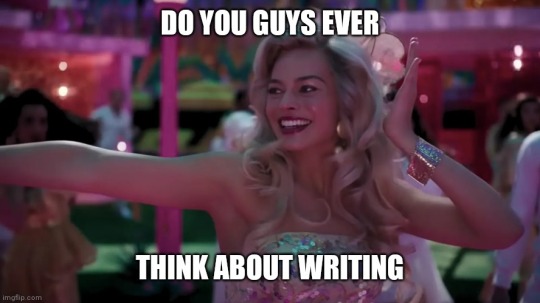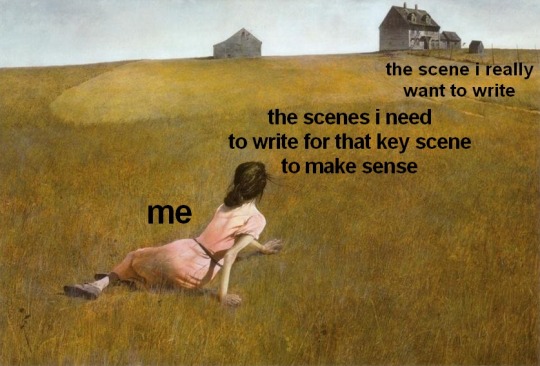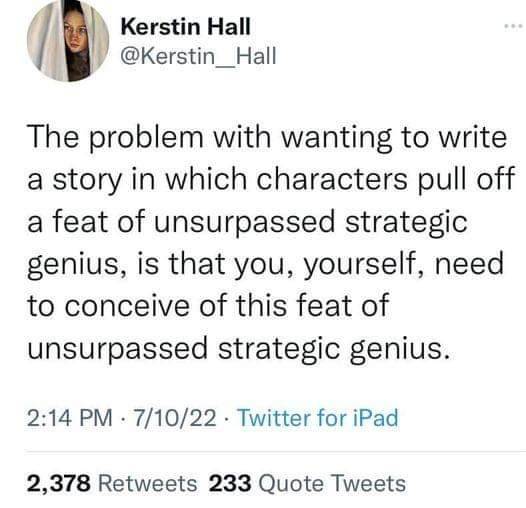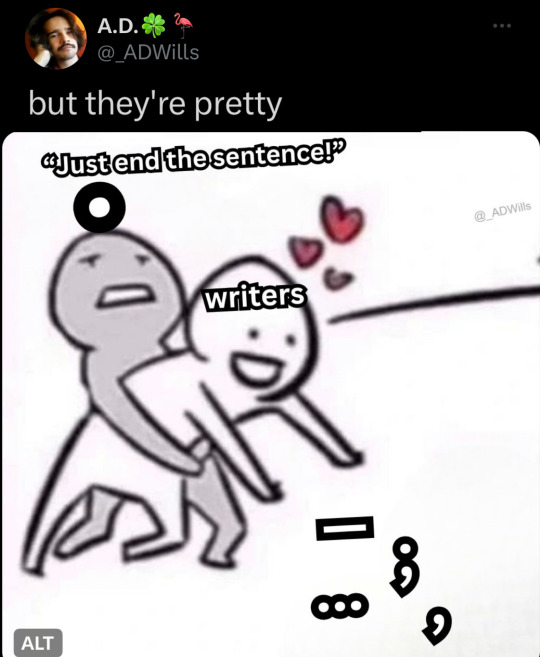Text
But, like, can I introduce everyone to The Emotion Thesaurus? Like literally every writer should know about it. Ever writer should own it. Please: https://www.amazon.com/gp/product/0999296345/ref=as_li_qf_asin_il_tl?ie=UTF8&tag=sep00-20&creative=9325&linkCode=as2&creativeASIN=0999296345&linkId=7b20ddaae3ac7dd3ce901f9f6c1b6439
How to show emotions
Part IV
How to show bitterness
tightness around their eyes
pinched mouth
sour expression on their face
crossed arms
snorting angrily
turning their eyes upward
shaking their head
How to show hysteria
fast breathing
chest heaving
trembling of their hands
weak knees, giving in
tears flowing down their face uncontrollably
laughing while crying
not being able to stand still
How to show awe
tension leaving their body
shoulders dropping
standing still
opening mouth
slack jaw
not being able to speak correctly
slowed down breathing
wide eyes open
softening their gaze
staring unabashingly
How to show shame
vacant stare
looking down
turning their head away
cannot look at another person
putting their head into their hands
shaking their head
How to show being flustered
blushing
looking down
nervous smile
sharp intake of breath
quickening of breath
blinking rapidly
breaking eye contact
trying to busy their hands
playing with their hair
fidgeting with their fingers
opening mouth without speaking
Part I + Part II + Part III
If you like my blog and want to support me, you can buy me a coffee or become a member! And check out my Instagram! 🥰
26K notes
·
View notes
Text
writers when they’re proofreading their works for the 34th time *find zero mistakes, there’s no typo, no grammatical error. everything looks good. hit the post button*
writers when they’re reading said works after they’ve been published like proud parents *find 52 mistakes at first glance, 38 typos and 14 grammatical errors with a bunch of inconsistencies and plot holes*
23K notes
·
View notes
Text
"why does writing take so long" because 60% of it is coming up with a sentence, realizing that sentence doesn't work the way you want it to, and staring at a wall
27K notes
·
View notes
Text
when u come up with a tiny change for your story that not only makes the writing flow better but also hammers in the character motivations and story theme

69K notes
·
View notes
Text
My writing abilities when I have an entire free day: twelve words. Take it or leave it
My writing abilities when I have to be somewhere in fifteen minutes: I got six thousand more in the pocket
32K notes
·
View notes
Text
How to Write Stakes that Aren't Life vs. Death
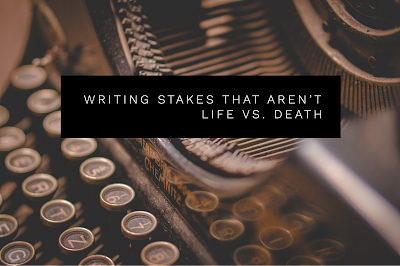
Writing strong stakes is critical for any story. But a question that often comes up for newer writers is, "How do I create stakes other than life vs. death?" Or essentially, "How do I write stakes that aren't life or death, yet are still effective?"
"Stakes" refer to what your character has to lose, what is at risk in the story. And obviously, potentially losing one's life, is a pretty big risk.
To address the questions, let's first look at why life vs. death stakes are so effective.
I know, it sounds obvious, like common sense even, and you may be rolling your eyes.
But understanding why they almost always work, will help you see how to create other similar stakes.
The thing about death is, it has a finality to it that almost nothing else has.
No one can come back from the dead.
That's it.
Death is the end of the road.
Done.
Gone.
Game over.
. . . Except that unlike "Game over," you can't restart the game.
In storytelling, this is one of the main reasons many of us want to grab life vs. death stakes. Everyone reading the book innately understands this. Death is final, you can't come back from that. It's a "point of no return." It can't be undone.
Great stakes will create a similar effect.
It's not literally life or death. But to some degree, there exists a figurative life-or-death situation.
For example, in The Office, after Michael accidentally hits Meredith with his car, he organizes a fun run on her behalf. Michael is driven by the desire to be liked by others. And after he hits Meredith, people don't like him. (I am simplifying the actual story just a bit.) With the fun run, he's hoping to redeem himself. He wants to be liked (or even admired) by others. To Michael, that hinges on his success with the fun run. If it's a success, people will like him again. If it's a failure, they won't (or they will dislike him even more).
There are seemingly only two outcomes: Success = liked. Failure = (forever) disliked.
From Michael's perspective, he can't have both.
Whichever path the fun run takes, the other path "dies."
You can't go back in time and change the outcome of the fun run.
It's final.
End of the road.
Done.
Gone.
The situation also, to some degree, feels like figurative life or death to Michael. He's driven to be liked, and that makes him feel alive. If he's disliked, it feels like "death." It mars him psychologically, and he feels like he can't come back from that. It feels like the end of the road.
The Office is not a high-stakes story (which is one of the reasons I'm using it), but it still has effective stakes that convey why what's happening (the fun run) matters (liked vs. disliked), which is something all good stakes do.
This example also shows two components related to crafting effective stakes: plot and character.
Let's dig a bit deeper into each.

One of Two Paths Forward
If you've been following me for a while, you may know that I like to define stakes as potential consequences. It's what could happen, if a condition is met. As such, any stake should be able to fit into an "If . . . then . . ." sentence.
If the fun run is a success, then Michael will be liked.
If the fun run is a failure, then Michael will be disliked.
Others may argue the stake is only what is at risk in the story--and that's fair.
But notice when we lay out potential consequences, they convey (directly or indirectly) what is at risk. In the example sentences above, we see that Michael's popularity (or the lack thereof) is what is at risk.
Potential consequences convey what will happen if a specific outcome is reached. And this lays out at least two possible paths forward.
If X happens, then Y happens.
Which also implies, if X doesn't happen, then Y doesn't happen.
Or, we may be more specific and say, if X doesn't happen, then Z happens.
In any case, by laying out the potential consequences, we lay out two paths forward.
I like to imagine it as laying down railroad tracks, which shows the paths the train could go.
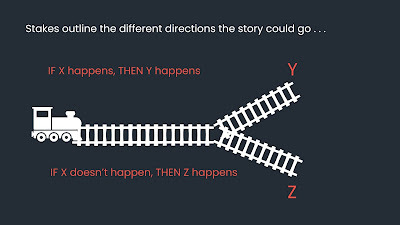
But notice the train can't travel down two paths at the same time.
It's an either-or situation.
That's what we want to set up in our stories, when it comes to stakes.
Covering every aspect of this topic is beyond the scope of this article, but at the basic level, it works like this.
The character has a goal (of which there are three types). Something opposes that goal (antagonist). And this creates conflict, which escalates.
There should be consequences tied to getting or not getting the goal.
If the character gets the goal, Y happens.
For example, if Harry successfully stops Voldemort from getting the Sorcerer's Stone, the Wizarding World will be saved.
If the character doesn't get the goal, then Z happens.
For example, if Harry fails to stop Voldemort from getting the Sorcerer's Stone, then Voldemort will return to power and the Wizarding World won't be saved.
These are potential consequences that the writer should convey before, or at least near the start of, the conflict.
Notice they also convey what's at risk (the Wizarding World's safety).
So these are the pathways the story could go.
But we can only travel down one.
We can't go two directions at once.
This creates a sense of either-or, similar to life or death. (Although admittedly, in my example, if Voldemort returns to power, there will eventually be death involved, but, generally speaking . . . )
This will also create a sense of finality, in the same way death does.
Figuratively speaking, the path we don't travel on "dies," because it is no longer an option. We can't go back and get on that train track. We've passed it. (We now have to deal with the consequences.)
When we hit an outcome--a condition--the pathway is selected.
Harry successfully stops Voldemort, so the Wizarding World is saved.
Harry successfully stopping Voldemort is also a turning point (a.k.a. a plot turn). It turns the direction of the story, it turns the story onto the path we laid out (since its condition was met).
With this, I like to think of the turning point as being the track that switches the direction of the train.
This switch also creates what some in the community call a "point of no return." (We can't go back and go down a different path. It's done. We are on a different trajectory now. (And yes, I am simplifying a bit.))

Stakes don't literally have to be life or death. But you need to set them up so that the pathways the story could go, look like either-or pathways. You need to set them up, so that outcomes can't be easily, foreseeably undone.
So let's look at a less dramatic example.
Your character needs to deliver an invitation to a royal wedding (goal). This isn't a life-or-death situation. In fact, it arguably sounds a little boring.
But when we tie potential consequences to it, not only does it become more interesting, but whether or not the character successfully does this, matters, because it changes the path, the trajectory of the story.
So, maybe we say . . .
If Melinda successfully delivers the invitation, then she'll be able to go to the royal wedding as well, which is where she'll have the chance to meet her hero.
I would need to communicate more contextual info to make this more effective. I would need to explain more about the stakes. Let's say her aunt said she'd take Melinda as her +1, if Melinda does this task for her (because the aunt really doesn't want to, because she has some high-priority things she needs to get done). Melinda's hero is from another continent, and she'll likely never have the opportunity to meet this person again. We could build it out more, so that she wants to get feedback on a project from her hero, and doing that could change Melinda's career path for the better.
We could even make her vocational situation more dire. If her current project isn't a success, then she'll be doomed to work for her father as his secretary (which she'd hate).
Now a lot hinges on successfully delivering this invitation.
If she successfully delivers the invitation, then Melinda can go to the wedding and get feedback from her hero, which will result in her not having to work for her father.
If she fails to deliver the invitation, not only will she not get to meet her hero at the wedding, but she'll have to work a job she can't stand.
Two paths forward.
She can't travel down both.
Now, we give her a lot of obstacles (antagonists) in the way of her delivering this invitation, so we have conflict (which should escalate).
Whether or not she delivers the invitation, is a turning point, because it turns the direction of the story, it turns her pathway. (Simplistically speaking, I could get more complex.) It's in some sense "a point of no return."
You can make almost any goal work, even a boring one, if you tie proper stakes to it.
The goal to survive (life vs. death stakes) is innately immediately effective, because we already understand it holds a "point of no return." If you die, you don't come back from that. There will also eventually be a point where, if you reach your goal, you won't be at risk of dying (at least, simplistically speaking, you won't die right at that moment.)
For other situations, you often need to build out and explain the stakes, for them to feel meaningful. You may need to provide contextual information, and you may need to walk the potential consequences out further so the audience understands everything that is at risk.
Let's talk about this from a character angle though . . .

Putting the Right Thing at Risk
One of the reasons the fun run Office example works, is because the writers put at risk what Michael cares about most: being liked. It's what motivates the majority of his actions on the show. It's what drives him. It's the want that he holds closest to his heart, his deepest personal desire.
Because it matters so much to him, the personal risk feels greater.
Michael feels, on some level, he will "die" psychologically, if he isn't liked or admired. (Which is also why he feels he will "die" if he is alone. (Even if he, himself, isn't fully conscious of either of these points.))
When the character cares about something that deeply, whether or not the character gets it, matters more.
Main characters should have at least one major want that drives them--something they want desperately, something they keep close to their hearts and deep in their psyches. It's often their most defining motivator. Michael wants to be liked. Harry wants to be where he belongs and is loved (the Wizarding World). Katniss wants to survive. Barbie wants to maintain a perfect life. Luke wants to become something great. Shrek wants to be alone so he can avoid judgment.
When we put any of those at risk, it raises the stakes.
. . . Because the characters not getting their deepest, heartfelt desires, has big personal ramifications on their psyches.
If what matters most to Shrek in his world is to be alone, and other fairytale creatures are being sent to his swamp, then the potential consequences are threatening what he holds most dear to his heart. Life as he knows it will figuratively "die" if he doesn't put a stop to it. (Of course, in order to complete his character arc, he has to be willing to let that part of him "die" so he can become something greater, someone more "whole.") It feels figuratively like "life or death" to him.
Ironically, putting the character's deepest desire at risk, can often be more effective than life or death stakes, because if you handled this right, you made sure to give the character a want that he will do almost anything to try to fulfill--even risk death for. Harry is willing to risk death to save the place where he is loved. Barbie is willing to risk death (well, at least her "life") in the real world to get her perfect life back. Luke is willing to risk death to become or be part of something great. Shrek is willing to risk death to get his swamp back (facing a dragon).
Recently I saw another great example of this while rewatching The Umbrella Academy. Hazel and Cha Cha kidnap Klaus and torture and threaten to kill him (to try to get information from him). But the torture and threats have no effect on him. In fact, Klaus gets off on it. Hazel and Cha Cha are at a loss as to how to break him.
While this is going on, Klaus eventually comes down from a drug-induced high. His superpower is that he can see and talk to the dead, but he hates that he has this ability--in fact, he's been traumatized by it (in a literal "ghost" story). It's actually the reason he's a drug addict to begin with. When he's high, he can't see or hear ghosts. Avoiding them is his deepest desire.
Torture and death don't break Klaus. What breaks Klaus is being unable to get away from the ghosts. It's only when Hazel discovers his stash of drugs and starts destroying it, that Klaus gets desperate. Not only are the drugs expensive (and he's broke), but worse, without them, Klaus has to face his greatest fear. He has to be surrounded by the dead. This is the exact opposite of his deepest desire.
In fact, to Klaus, this is something worse than death.
Some things are worse than death. And often, those things include your character's deepest desire, the want he holds closest to his heart.
Now sometimes, those things may overlap (like with Katniss being driven to survive), but most of the time, they will be different things. If you think about yourself, there are probably some things you would risk death for. Your first thought is probably your loved ones, and that is another risk you could consider for your characters, but I also bet, if we took that away as an option, you could think of a few other things, like a belief or way of life. Something you would uphold or defend when it's threatened. Something that would get you to do what you wouldn't ordinarily do, if it was at risk.
From there we create pathways again. Barbie can choose to risk the real world to get her perfect life back, or she can choose to remain in Barbieland and have her perfect life continue to deteriorate. She can't have both. Klaus can give up any information he has to try to save his remaining drugs, or he can resist and suffer a plague of ghosts. Shrek can let the fairytale creatures "kill off" his way of life, or he can go on a quest that could get rid of them.
This is still simplistically speaking, but the point is, you've put what the character cares deeply about at risk, and have laid out two paths forward, and the character can only choose one. She can't go in two directions at once.

Stakes don't literally need to be life vs. death to be effective, and in fact, as I've pointed out, some things are worse than death. One of those things is whatever the character wants most.
The idea is to lay out potential consequences--different pathways that appear as either-or trajectories. Either the story goes down path Y or it goes down path Z. The character then has to deal with the consequences of the path; she can't travel in reverse. She can try to diminish or compensate for the consequences (if they are undesirable), but she can't go back and change the track her train is on.
For most stakes that aren't life vs. death, you will need to convey to the audience what those potential pathways are, because they won't be built in like they are for life-or-death situations. One way to do this, is to literally write "If . . . then . . . " sentences into the story ("If X happens, then Y happens"), but you can convey them indirectly as well. The point is that you do communicate them to the audience, because if you don't, the audience won't see or feel the stakes, and so they won't be effective. And in that case, they will never be as impactful as life vs. death stakes.
Also, if you're interested in learning more about my take on stakes, I'm teaching a class on it at the Storymakers conference this May (virtual tickets are available for those who can't attend in person). I also get more into stakes (and plot) in my online writing course, The Triarchy Method (though the course is currently full, I'll offer it again in the future, so I still wanted to mention it. 😉).
Happy Writing!
56 notes
·
View notes
Text
writers whenever they’re starting a new fic: I have these ✨ vibes ✨ now I’ll have to build an entire plot and write an entire fic about those vibes
27K notes
·
View notes
Text
“How’s your WIP going?”

"Have you made any progress?”

“How close are you to being done?”

43K notes
·
View notes
Text
“how did you get into writing” girl nobody gets into writing. writing shows up one day at your door and gets into you
123K notes
·
View notes
Text
me writing the epilogue to my story: "wow i'm so close to finishing i can finally work on other projects!"
*writes a summary of the protagonist's life in the intervening years and accidentally makes it really interesting*
"wellllll maybe a few bonus short stories exploring that wouldn't hurt"
96 notes
·
View notes
Text
Writing would go much faster if I didn't feel like I needed situations to be as accurate as possible
214 notes
·
View notes
